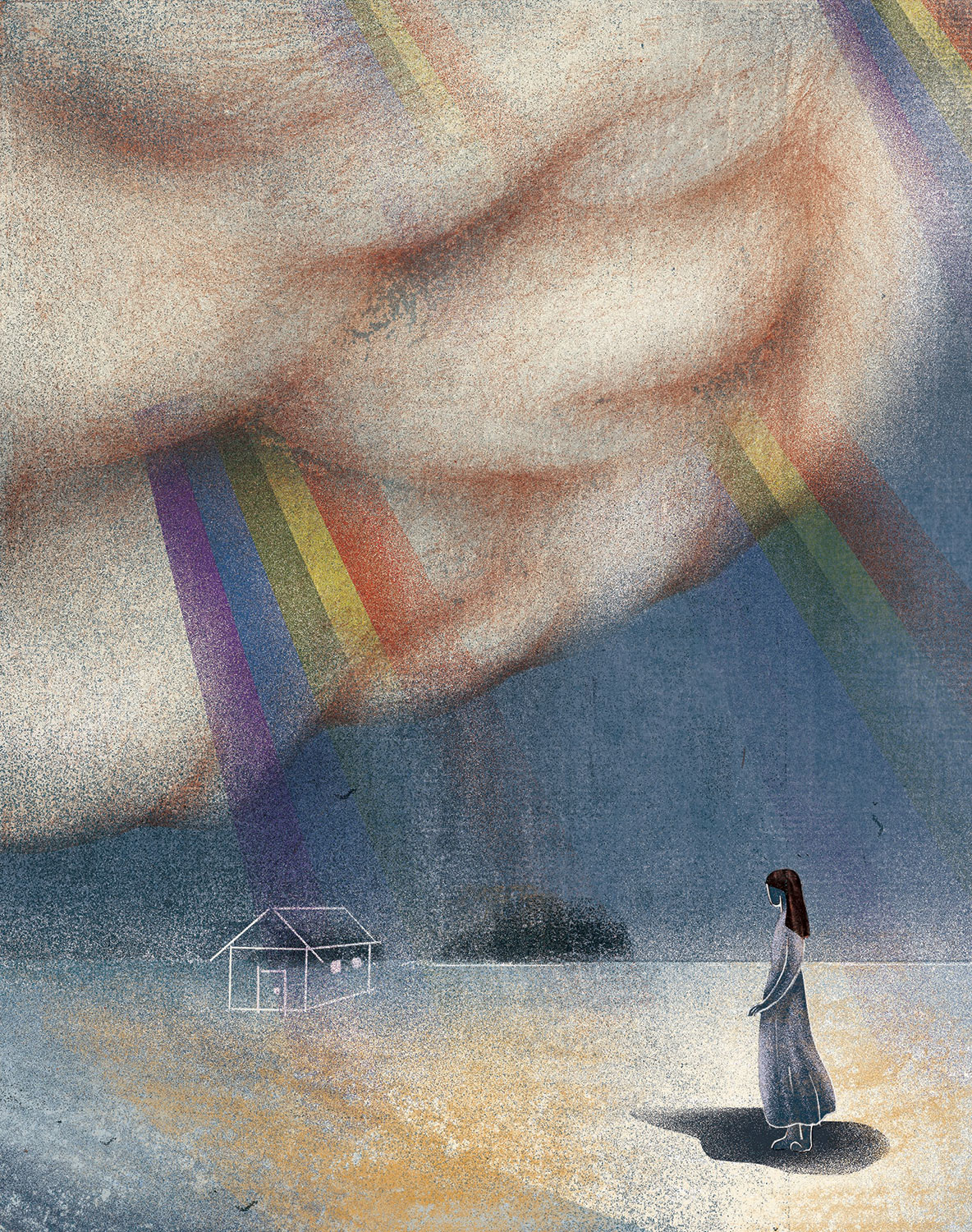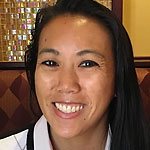
The tension of navigating sexual orientation while living out Christian faith has been one of the defining struggles of our generation. Yet for Serena, her faith never came into question as she learned to embrace her queer identity. Instead, she found a fuller joy in God by embracing all of who she was.
My parents are a power couple in the Chinese Christian community in the United States and abroad. I liken them to the Clintons; they have an equal and equitable partnership and are both seen as leaders. And being their only child, I’m their Chelsea. That is, until I came out.
In my family, the pursuit of Jesus was the sole purpose for living and the rationale was that if you find and follow Jesus, joy is a happy byproduct. I was my family’s pride and joy because I followed Jesus.
My dad, a first generation immigrant to Calgary, Alberta from Hong Kong, is an evangelical pastor; and my mom, a first generation immigrant to San Francisco also from Hong Kong, was a child and family psychologist who quit her private practice to partner with my dad in full-time ministry.
As a couple, they started multiple churches and headed the Bay Area Chinese church I grew up in. Currently, they lead a Chinese church in New York, an international healing and deliverance ministry, and an orphanage in China for kids with special needs.
Like Chelsea, I was a good kid. By tiger mom standards, I was an ideal kid: honor roll AP student, varsity basketball athlete, part-time employee, classical piano student since the age of 5, and an active leader in multiple clubs on campus (including the founder of the first Asian club).
As a pastor’s kid (PK), I was also a superstar: leader in the youth group, Bible nerd, worship team member, and even a promise ring holder. I was the ultimate Asian PK — the apple of my parents’ eye, the pride of their church.
By all accounts, I was following Jesus and doing everything I was told that would make me successful and happy. So where was my joy? Even though I was surrounded by loving family and friends, why did I still feel so lonely?
All throughout high school, college, grad school, and ministry school I remained single — waiting for the “right man” to come along. I constantly heard the same rhetoric — that it’s all God’s timing or that if I am obedient and follow God, He will give me the desires of my heart.
One of the greatest desires of my heart was to share my life with someone. I felt that I had done everything I was supposed to in my pursuit of Jesus. So why was I in my 20s and still alone? Why wasn’t I interested in any of the Christian men around me, and why did they seem to not be interested in me?
As I progressed into my mid-20s, this became a point of great frustration and unhappiness for me. I felt like I was doing everything right in the eyes of God (and my parents) but I was lonely and unhappy.

As advised by the church, I, as a single woman of God, developed close friendships with other sisters in Christ. There were at least two occasions when these close friendships developed into something emotionally deeper. These relationships would be my first taste of emotional intimacy with another person and I desired more. Not being able to take those relationships any further pushed me into an unhappy and joyless state.
I began to feel a disconnect between my pursuit of Jesus and life-giving joy. This frustration drove me to reexamine my life, my faith, and my journey. To gain better clarity, I moved to New York City to be far away from my parents and their church’s sphere of influence. I wanted to be able to focus on myself and my relationship with God without people telling me what to do.
I attended The Brooklyn Tabernacle for a while instead of going to my friends’ churches, because I wanted to be able to meet God without having any distractions. I wanted to go somewhere where no one knew my name or who my parents were. Brooklyn Tabernacle was big enough that people didn’t bother me or talk to me unless I asked for it. The worship was also amazing (as a former worship leader, worship was how I met God), and the sermons were sound and applicable. I was searching for a faith that was defined by me and not by other people.
As I delved into my faith and the source of my unhappiness, I realized that my sexuality was in the center of the discord. There was a large part of me that wasn’t living authentically because I was ignoring my sexuality. And this inauthenticity bred my unhappiness.
Growing up, I was attracted to girls — all my crushes in high school were girls. I had to suppress those feelings and “pray against” them, as I was told that it was sinful and not part of God’s design for me.
As I settled into NYC and explored the city, I began to explore my sexuality as well. I was aware of my suppressed attraction to women and wondered if by ignoring these attractions I was really ignoring a part of God’s design for me. I was hesitant to explore these ideas because of fear — fear of God’s wrath and fear of my parents’ judgment. But I needed to know for myself if my attraction to women was a real part of me.
I signed up for several dating sites and waited to see what would happen. On the Christian dating site, I was not impressed by the men who would contact me. The women on the lesbian dating site, however, intrigued me. I found myself much more physically and emotionally attracted to the women than the men. This confirmed that my attraction to women wasn’t just a phase I went through as a teenager but was something deeper and real. It was clear to me at that point that I was queer.
As much as it was a relief to finally allow myself to explore what came most naturally to me, I struggled with what my authentic living would mean to my parents, their ministries, and those who looked up to me. As I wrestled with what my sexuality would mean for other people, I realized that I couldn’t live my life so that other people would be comfortable.
I also realized that, throughout this coming out process, I never once questioned my relationship with God. As I began to come out to my friends, I had one friend ask me if my relationship with God had suffered since I had come out. I remember thinking that it was such a strange question.
Coming out didn’t make me lose Jesus — it led me closer to Him because in experiencing the fullness of myself, I could more fully see how God loved and accepted all of who I am. I felt that I was finally fulfilling His designs for me. In this, I found joy and wanted to share in this joy with my family and friends — including my parents.
Sharing my joy with my parents didn’t go so well. I still ask myself: What did I expect — for them to be like my friends’ parents and welcome me with open arms, ecstatic that I’m living authentically and that I’m sharing my life with them?
I came out to my parents twice in the span of a few years. The first time I was promptly shoved back into the closet, and my parents threatened to quit their ministries (in essence, cut off their livelihood), sell their house in California, and move to NYC to help me not be gay. But I couldn’t risk them losing their livelihood because of me.
I felt the Asian guilt and responsibility to take care of my parents as their only daughter. The only way I could stop them was to pray with them, confess my sins of homosexuality, exorcise the demons of sexual perversion, and let the Holy Spirit cleanse and heal me.
A few years later, I came out again — for the final time. I endured harsh and desperate words from my parents: I would die, because if I get sick, God wouldn’t heal me; I was a terrible daughter; I gave my mom cancer as punishment for my sins; and my greatest pride was their deepest shame. Those last words hurt me the most. As an Asian American, bringing pride to my parents is one of the few ways I get to make them happy. Bringing shame to them and our family is one of the worst things that I could’ve done.
To be fair, during this difficult time my parents never verbally disowned me, and always told me that they loved me. In retrospect, I see that their actions were done out of love as they were desperate for my soul’s salvation. For them, I was actively rebelling against God and rejecting Jesus. And for them, if I didn’t have Jesus, I didn’t have joy because I was on the path to hell.
But during this whole process, I never felt without joy. Yes, it was hard coming out to my parents, and the loss of my relationship with them (as they still do not accept me) is a constant ache in my heart. And yet, I had found joy — not in being the perfect Asian PK — but being able to embrace more of how God made me.
One thing that I’ve learned is that joy doesn’t mean a life without struggle. I find joy in my authenticity, even if it means a loss of friends and family. I find joy with my wife of nearly four years, even if my parents didn’t attend our wedding and still refuse to meet her. I find joy in our life back in California, even though my parents moved away (to NYC, no less) the month I moved back. I also find joy in the life my wife and I are bringing into this world, even though I have no idea if my parents will accept their grandchild.
Being my authentic self has, by no means, made my life perfect or without pain. But I know and accept all of who I am now, which is the only way I could truly experience God. I feel fully seen, and what a joy that is.

Serena J. Poon is a second generation Chinese American with roots in the Bay Area and New York City. Brought up in evangelical and charismatic ministries, she currently supports the spiritual and psychological well-being of queer evangelical Christians and their allies and is a finance professional. She lives in San Jose, California, with her wife, soon-to-be son, and two dogs.
